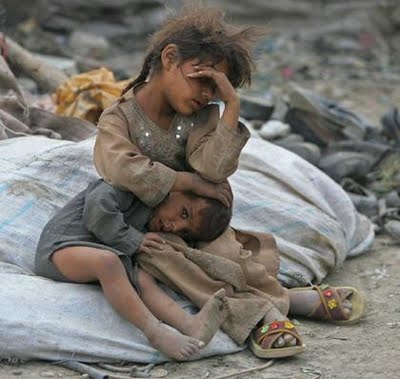Ansar Ul Yateem is an community based charitable organisation that aims to bring relief , support and community development to the victims of drone attacks in the tribal areas of Khorasan [ Pakistan and Afghanistan ]

Wednesday 26 September 2012
Living Under Drones
http://www.warcosts.com
Since 2004, up to 884 innocent civilians, including at least 176 children, have died from US drone strikes in the North Waziristan region of Pakistan. A new report from the Stanford and New York University law schools finds drone use has caused widespread post-tramatic stress disorder and an overall breakdown of functional society in North Waziristan. In addition, the report finds the use of a "double tap" procedure, in which a drone strikes once and strikes again not long after, has led to deaths of rescuers and medical professionals. Many interviewees told the researchers they didn't know what America was before drones. Now what they know of America is drones, death and terror. Follow the conversation @WarCosts #UnderDrones
Monday 24 September 2012
Deadlier drones are coming
COLUMBIA, S.C. — Aerial drones are America's newest frontline weapon in an escalating global campaign against Islamic militants. And they could get a lot more dangerous in coming years as their underlying technology advances.
Compared to today's fairly rudimentary Unmanned Aerial Vehicles (UAVs), the drones of the future will be faster and more heavily armed. They will also have better sensors plus more sophisticated computers allowing them to plan and execute attacks with less human participation
please read on
http://www.globalpost.com/dispatch/news/regions/americas/united-states/120920/deadlier-drones-are-coming
Compared to today's fairly rudimentary Unmanned Aerial Vehicles (UAVs), the drones of the future will be faster and more heavily armed. They will also have better sensors plus more sophisticated computers allowing them to plan and execute attacks with less human participation
please read on
http://www.globalpost.com/dispatch/news/regions/americas/united-states/120920/deadlier-drones-are-coming
The Drone Age
The global market for drones is booming. But what does the coming arms race mean for US national security interests — and the future of warfare? GlobalPost correspondents report from critical locations around the world, from Israel to Iran to Yemen to Brazil — where unmanned aerial vehicles are radically transforming combat and surveillance.
http://www.globalpost.com/special-reports/the-drone-age-why-we-should-fear-global-proliferation-uavs
Monday 3 September 2012
U.S. drone strike kills muslim families in Yemen,
Sanaa, Yemen (CNN) -- A U.S. drone strike targeting al Qaeda suspects in Yemen killed 13 civilians, including three women, three security officials in the restive Middle Eastern country said.
"This was one of the very few times when our target was completely missed. It was a mistake, but we hope it will not hurt our anti-terror efforts in the region," a senior Yemeni Defense Ministry official told CNN. The official asked not to be named because of the sensitivity of the issue.
The United States typically does not comment on reports it has used unmanned aircraft to target terror suspects, but is widely believed to be doing so in Yemen, a key battleground against al Qaeda.
Families of the victims closed main roads and vowed to retaliate. Hundreds of angry armed gunmen joined them and gave the government a 48-hour deadline to explain the killings, which took place on Sunday.
Eyewitnesses said that families attempted to carry the victims' corpses to the capital, Sanaa, to lay them in front of the residence of newly elected President Abdurabu Hadi, but were sent back by local security forces.
"You want us to stay quiet while our wives and brothers are being killed for no reason. This attack is the real terrorism," said Mansoor al-Maweri, who was near the scene of the strike.
The strike took place near the town of Rada in al-Baitha province on Sunday, Yemeni officials said.
A senior Defense Ministry official said the strike initially targeted two members of al-Thahab clan who lead the terror network's operations in the province. He said the militants were in a vehicle near the one that was hit, and fled unharmed.
At least 200 suspected al-Qaeda fighters are believed to be hiding in the province.
Earlier this year, militants occupied Rada and declared it as an Islamic emirate. But two weeks later, they evacuated the town after authorities released al Qaeda prisoners.
Residents are not denying the existence of al Qaeda elements in their region but say that misdirected strikes work in favor of the militant group, helping them recruit new operatives.
"I would not be surprised if a hundred tribesmen joined the lines of al Qaeda as a result of the latest drone mistake," said Nasr Abdullah, an activist in the district of the attack. "This part of Yemen takes revenge very seriously."
The latest attack was the fourth drone strike reported this week. The first three hit their targets, killing at least 12 suspected al Qaeda militants, according to Yemeni officials.
Radical American-born cleric Anwar al-Awlaki, who was killed in September 2011, is the highest-profile target of an American drone hit in Yemen to date. He was linked to several terror plots, including the shootings at Fort Hood in 2009.
Subscribe to:
Posts (Atom)

